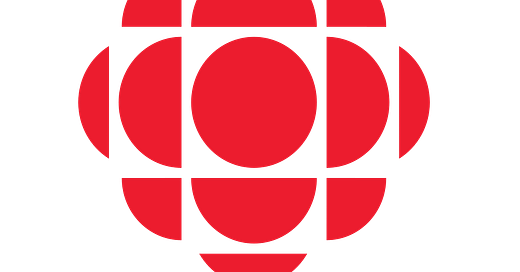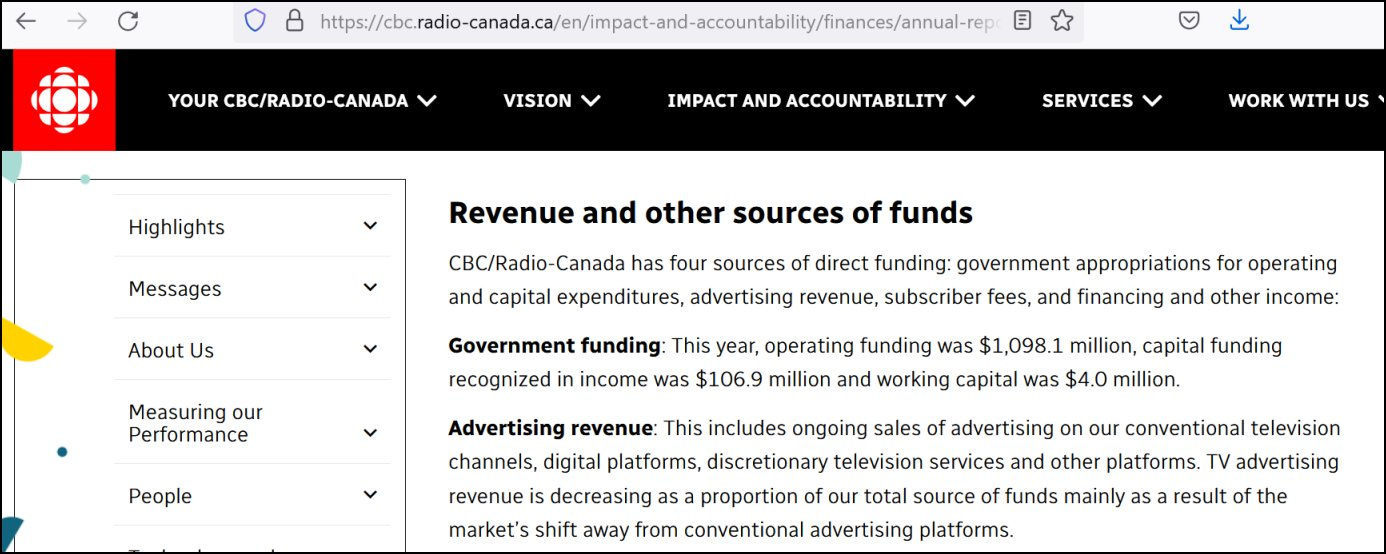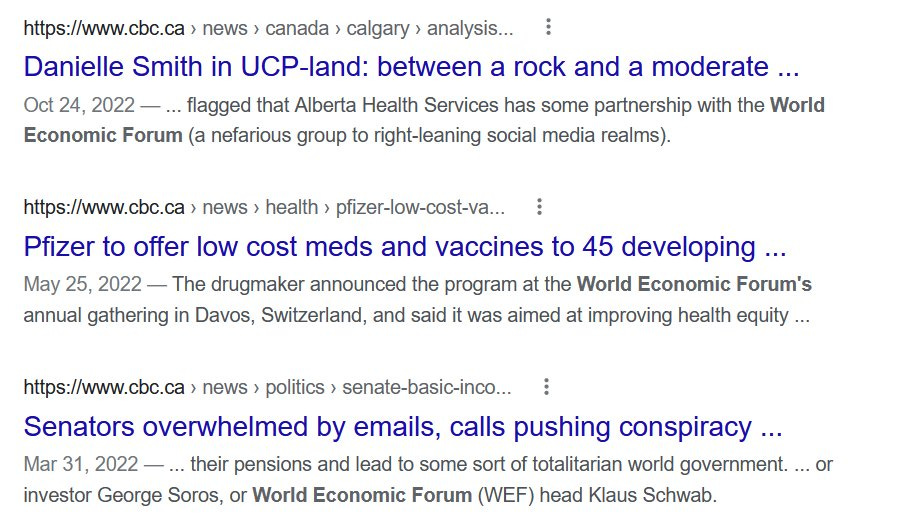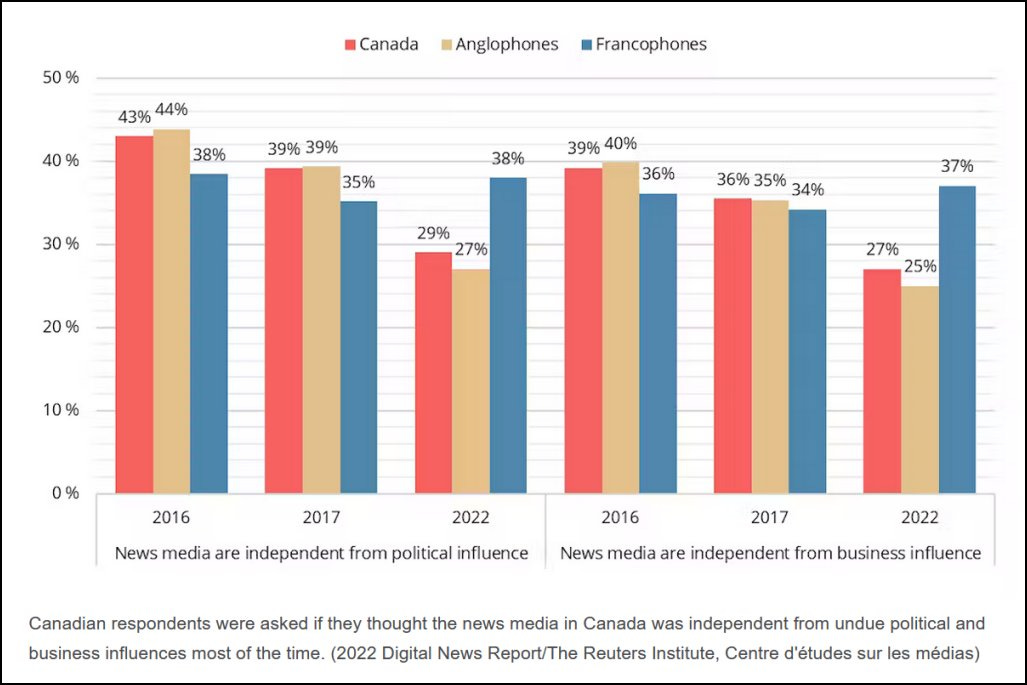CBC pushing opinion pieces as news articles
by Dan Fournier, Opinion, published Wednesday, Nov. 2, 12:15 EDT on fournier.substack.com
Image source: Wikimedia Commons
An October 24 news article from CBC’s Calgary’s office titled Alberta Premier Danielle Smith says she distrusts World Economic Forum, province to cut ties seems to have been crafted more as a biased hit piece rather than an objective news article.
The article was written by Dean Bennet who has been writing for the CBC since at least September of 2020.
The author frequently employs the demeaning label ‘conspiracy theories’ to indirectly disparage the character of his apparent target, Alberta Premier Danielle Smith.
The newly-elected Smith has recently not spared words about her discontent towards the World Economic Forum and its leader, though she didn’t specifically refer to them by name.
For it, she has been repeatedly castigated by various mainstream outlets across the country.
Clear bias & other journalistic breaches
Impartial and objective news reporting should be conducted on the basis of the absence of personal bias, unless it is expressly stated as opinion.
CBC’s own Journalistic Standards and Practices clearly state their mission, principles, and values. Among them we find the following:
“Mission: To reflect diversity We are committed to reflecting accurately the range of experiences and points of view of all citizens. All Canadians, of whatever origins, perspectives and beliefs, should feel that our news and current affairs coverage is relevant to them and lives up to our principles.”
“Our Principles. Impartiality We provide professional judgment based on facts and expertise. We do not promote any particular point of view on matters of public debate.”
“To protect our independence We are independent of all lobbies and of all political and economic influence. We uphold freedom of expression and freedom of the press, the touchstones of a free and democratic society. Public interest guides all our decisions.”
“Opinion. Expression of Opinion Our value of impartiality precludes our news and current affairs staff from expressing their personal opinions on matters of controversy on all our platforms.”
“Language. Quality and Precision The use of certain highly charged words can undermine credibility and merits special consideration. Language is constantly evolving. We will be attentive to shifts in the meaning of words. We consult language resources and editorial management as needed to grasp the impact of expressions that are open to multiple interpretations and capable of offending some audience members.”
So, let’s have a look to see whether or not the CBC editorial staff has upheld these values and principles with the article in question.
Firstly, they state that they are committed to accurately reflecting the points of view of all citizens. Particularly since the start of the Covid-19 Pandemic, many Canadians have expressed their discontent towards the World Economic Forum and its influences on Canadian politics. Yet, when is the last time the CBC ever offered an article critical of the group? Why are such opinions not included in their reporting? The same can be said about the growing segment of the population that are of opposing views towards Covid-19 vaccinations. When have their views been included in CBC’s reporting? With such imbalance, it is quite evident that they are not sticking to their own stated mission point regarding diverse views.
Next, they state that they “are independent of all lobbies and of all political and economic influence.” This is categorically a falsehood, for they are vastly funded by the Trudeau government:
Screenshot taken from CBC’s 2019-2020 Annual Report (section: Financial Sustainability – Revenue and Other Sources of Funds).
Pie chart showing CBC’s sources of funding for 2019-2020 (section: Financial Sustainability – Revenue and Other Sources of Funds).
Such funding does not come without expectations. Our own Prime Minister has stated, though in a tongue-in-cheek fashion, that very notion.
In reality, such funding comes from Canadian taxpayers. Accordingly, as they receive funding from Canadian citizens, shouldn’t they use them to represent the diverse views of all of these taxpayers?
And if they were truly “independent of all lobbies and political influence”, then why don’t they ever criticize the WEF and their policies in their news reporting?
Independence
“Public interest guides all our decisions”, concludes CBC’s section on independence. If this were the case, wouldn’t statements made by the very powerful and influential group’s founder Klaus Schwab – who openly brags about controlling a large portion of Trudeau’s cabinet, including the Prime Minister himself – be of public interest?
To add further to this point, CBC’s Bennett adds the following [emphasis added]:
“It [the World Economic Forum] became the focus of attacks from the right during the COVID-19 pandemic, when it promoted a "great reset," calling for ideas on how to better organize global society post pandemic.”
“That started online conspiracy accusations, unproven and debunked, that the forum is fronting a global cabal of string-pullers exploiting the pandemic to dismantle capitalism and introduce damaging socialist systems and social control measures, such as forcing people to take vaccines with tracking chips.”
In a prior opinion piece entitled Why society needs Conspiracy Theories & Conspiracy Theorists, this author outlined many issues of concern regarding this Great Reset. Among them, the power and influence the private entity holds on governments and their cabinets such as with the Dutch government.
Moreover, the CBC’s principle of impartiality asserts that they “provide professional judgment based on facts and expertise,” and “do not promote any particular point of view on matters of public debate.” Two issues of contention here. First, this news article fails to provide factual evidence with their assertion that the conspiracies [surrounding the WEF] have been “unproven” and “debunked”. The author fails to mention which precise conspiracies he is referring to. So, this blanked assertion is quite sloppy and ridiculous.
Furthermore, in his rhetoric, Bennett then implies through continued ridicule that critics of the WEF claim it is a front for globalist cabal string-pullers intent on introducing damaging socialist systems and social control measures. What the CBC author ironically fails to realise is that there is plenty of evidence that suggests just that.
The WEF does have an extremely powerful group of influential and well-connected parties across the globe involved in multiple endeavours – some good and some not so good.
One example of a highly questionable “string-pulling” endeavour involves that of pushing the Climate Change agenda by using very questionable and coercive practices to benefit elitist bankers and fund managers.
For instance, I have thoroughly documented how one of its operatives – Mark Carney (former Governor of the Bank of Canada and the Bank of England) has been strong-arming financial regulators across the globe, including several in Canada, to impose very harsh control measures whereby individuals and businesses are being clobbered by excessive climate-reporting standards.
Adding to the notion of impartiality, the CBC states: “We do not promote any particular point of view on matters of public debate.” If this were the case, then why is Bennett presenting his views on this matter of public debate?
As demonstrated across social media and alternative platforms, the WEF and its influence has been a controversial issue in Canada and elsewhere. So, it is definitely a matter of public discourse. Sadly though, mainstream media has been taking sides on this debate.
Language
The greatest enemy of clear language is insincerity, stated the English novelist, George Orwell.
They way language is used in news reporting ought not be filled with hidden innuendos and subliminal hints.
Sadly though, in today’s politically- and corporate-driven media, it is practically inescapable.
TRANSCENT International outlines this troubling trend in great detail; and the opener to their research outlines why we should care:
“Ever-mounting media consolidation has narrowed the perspectives the public is privy to. Ownership and funding of these corporations are riddled with conflicts of interest and Big Tech companies are outright censoring and demonetizing independent outlets.”
CBC’s guidelines on language state that the “use of certain highly charged words can undermine credibility and merits special consideration.” And with good reason.
Sadly though, the news article in question markedly fails to uphold this belief. Credibility is indeed lost when highly charge words such as “conspiracy theories”, “the right”, and “left-wing” are employed. Such words foment hatred and division.
Seasoned journalists who write for mainstream outlets are well aware of their intended effects, yet frequently use them to disparage their targets.
While this practice can arguably be acceptable in opinion pieces, it doesn’t have a place in honest news reporting.
Accordingly, the CBC’s editorial team has failed in its duty to uphold its own principles.
Ethical considerations
There is a strong ethical consideration that needs to be examined with regards to passing this piece as a news article rather than an opinion piece.
Since it is presented as a news article, its readers may be left with the impression that those who oppose the World Economic Forum or its policies are “right-wing conspiracy theorists.”
In other words, they indirectly (or deceptively) present it as fact that the WEF and its policies should be considered legitimate and unquestionable.
This tactic can easily be interpreted as a kind of manipulative trickery which also encourages division in lieu of healthy debate or discourse.
Alberta Health Services (AHS) & the WEF’s Global Coalition for Value in Healthcare
Bennett’s article as well as those spinning the same tune all mention that Premier Danielle Smith is cancelling the health consulting agreement between AHS and the Global Coalition for Value in Healthcare. Yet, they fail to mention how AHS actually benefits from this agreement in the first place, other than mentioning that it involved connecting with reputable players such as the Mayo Clinic and Harvard University. So what?
Couldn’t they have provided at least a single reason why the agreement should continue? It’s like they didn’t even care spending 10 minutes to research this coalition.
Further, Bennett and the others didn’t seem to have actually contacted AHS for comment about their expectations regarding this agreement and their possible benefits. Wouldn’t that have been worth looking into and newsworthy? Instead, only criticism directed toward Smith and her cancellation of the agreement came about.
More honest reporting would have included explanations as to why cancelling the agreement would prove harmful.
Digging a bit into the coalition itself leads us to a lot of dead ends. They don’t even have their own website. And its latest news releases date back to 2021.
Furthermore, they did invite participating parties to submit research abstracts, presumably for ideas to improve healthcare systems, yet none of these have since been shared or published. And for clinical health care providers who wish to attend them, they will need to pay hefty fees ($1,500 for a conference pass and $1,200 for a virtual pass). Perhaps good ideas related to healthcare improvements will come about. Like with any partnership, there’s always a cost-benefit balance that needs to be considered. And the main point here is that none of these possible benefits were forthcoming in Bennett’s or his counterparts’ articles.
Why is the CBC obsessed with protecting the World Economic Forum?
Here’s a little experiment for the reader to try out. Google CBC’s website with the phrase “world economic forum” and see what articles are listed. Then sort them to see the ones from the past year.
Here are the top 10 articles that will be displayed:
As you can see, labels such as “conspiracy theorists”, “right-leaning”, “conspiracy”, and similar highly charged words abound. They almost all spew the same kind of rhetoric.
A clear lack of balanced reporting, i.e., good and bad/critical aspects of the WEF, seems to be the norm with the CBC and other Canadian mainstream outlets.
For the nation’s top news organization to go against its own prescribed values of impartiality, independence, as well as its commitment to accurately reflect the diverse views of all Canadian citizens, shows us that they have greatly deviated from that path.
That is perhaps why trust in Canadian media has waned significantly over the past few years.
Canadians are increasingly mistrustful about news media
Last June, The Conversation Canada (Academic Journalism Society) published a piece called Canadians’ trust in the news media hits a new low which revealed a steady decline in trust in the Canadian news media, sinking to its lowest point in seven years.
The study they cite was produced by the Reuters Institute for the Study of Journalism at the University of Oxford.
It found that trust in the news has dropped 13 per cent since 2016. And Only 42 per cent of Canadian respondents trust “most news, most of the time.”
With regards to media independence, Canadians expressed lower levels of confidence in the news media’s independence from both political and commercial influences.
Image source: The Conversation Canada – Canadians’ trust in the news media hits a new low, June 14, 2022
The graph above corroborates some of the points discussed earlier, namely that media in Canada has lost a significant level of independence due to political and commercial interests.
And sadly, the trend doesn’t appear to be reversing any time soon.
Another report from mid-June by LifeSiteNews.com (a non-profit Internet news service dedicated to issues of life, family, and many related issues) titled Oxford study reveals Canadians’ trust in the media at record lows since COVID outbreak echoes the same trend.
They cite a recent Oxford University study which indicates that only 39 percent of English-speaking Canadians say they trust the media.
Here are some key highlights [with emphasis added]:
“As the study mentions, state-sponsored media has been a hot-button issue in Canada in recent months, particularly in light of the Conservative Party of Canada leadership race currently underway in the nation.”
“While the CBC is the most heavily subsidized media outlet — receiving more than $1 billion in taxpayer funds per year — Prime Minister Justin Trudeau’s government also gave $61 million in so-called pandemic relief subsidies to more than 1,000 media outlets before his election in 2021.”
“Critics have suggested that Trudeau’s generous monetary support for the mainstream media is tantamount to a form of collusion, with outlets receiving money from Trudeau garnering a reputation for being biased toward his Liberal Party platform.”
Goodbye CBC!
But perhaps what is even more telling and revealing from this article relates to the stunning admissions of a long-time CBC journalist who quit the media outlet because she could no longer bear their departure from real journalism.
To wit, LifeSiteNews.com ran a January 5 article on this particular aggrieved CBC employee.
The report encapsulates the most salient points as to why Tara Henley, a 20-year journalist and producer, quit the state broadcaster in disgust. Among them, cited from her January 3rd Substack post Speaking Freely, Why I resigned from the Canadian Broadcasting Corporation, CBC’s “radical political agenda” and increasingly “woke” culture figured atop the list of reasons for her departure.
The following excerpts showcase some of the key grievances Henley holds towards her former employer:
“In a short period of time, the CBC went from being a trusted source of news to churning out clickbait that reads like a parody of the student press. Those of us on the inside know just how swiftly — and how dramatically — the politics of the public broadcaster have shifted.”
“To work at the CBC in the current climate is to embrace cognitive dissonance and to abandon journalistic integrity.”
“It is to sign on, enthusiastically, to a radical political agenda that originated on Ivy League campuses in the United States and spread through American social media platforms that monetize outrage and stoke societal divisions. It is to pretend that the “woke” worldview is near universal — even if it is far from popular with those you know, and speak to, and interview, and read.”
“To work at the CBC now is to accept the idea that race is the most significant thing about a person, and that some races are more relevant to the public conversation than others. It is, in my newsroom, to fill out racial profile forms for every guest you book; to actively book more people of some races and less of others.”
“To work at the CBC is to submit to job interviews that are not about qualifications or experience — but instead demand the parroting of orthodoxies, the demonstration of fealty to dogma.”
“It is to become less adversarial to government and corporations and more hostile to ordinary people with ideas that Twitter doesn’t like.”
“It is to consent to the idea that a growing list of subjects are off the table, that dialogue itself can be harmful. That the big issues of our time are all already settled.”
“It is to capitulate to certainty, to shut down critical thinking, to stamp out curiosity. To keep one’s mouth shut, to not ask questions, to not rock the boat. This, while the world burns.”
“How could good journalism possibly be done under such conditions? How could any of this possibly be healthy for society?”
These are extremely revealing admissions from a former insider at the Canadian Broadcasting Corporation.
One may wonder how many other employees at the CBC fare in this kind of toxic environment.
As for Henley’s credibility, the fact that she was a long-time employee mixed with the nature of her assertions – which do fall in line with a lot of the issues brought up in this exposition, tend to make her authentic, rather than just a disgruntled employee on an epic rant.
The bigger question which hangs in the balance, though, is will the CBC and other state media in Canada change their ways? Or, will they opt for the status quo by continuing business as usual along the same regrettable path?











Awesome piece of journalism and commentary. I'll save this.
Great job Dan. I commend you, as a fellow "conspiracy theorist" (read: independent thinker) , on your irrepressible proclivity towards revealing bullshit.
The fact that anything you have written here should even need such strenuous exposition or defense says much about our sorry state. Most of this should be entirely obvious to anyone with a modicum of skepticism or basic thinking skills...or even the capacity to do the most cursory internet search...but alas.
I think what we're up against here is a kind of numbers game; a cold calculus deployed at the scale of society and indeed globally. It actually doesn't matter what "truth" or demonstrable "reality" are. (Orwell covered this nicely). What matters is what the "herd" perceives. In this environment of information warfare and universal deceit anything goes and nothing matters.
Just look at some of the testimonies by gov't "officials" (the real "insurrectionists") at the POAC hearings. They lied. We knew they lied. They know we knew they lied. But it doesn't matter. There are not enough of us that know that they lied. Hell, most people weren't even paying attention. I have neighbours who don't even know what the Emergencies Act is, let alone that it was invoked. Can this be possible? How can this be possible?
They say history may not repeat, but it sure as hell rhymes - which is why we should pay more attention to its lessons than we appear to do.
On that note here is a little reminder of historical precedent:
Writing the News - United States Memorial Holocaust Museum Encyclopedia
"Shortly after taking power in January 1933, Adolf Hitler and the Nazis succeeded in destroying Germany’s vibrant and diverse newspaper culture. The newly created Ministry of Public Enlightenment and Propaganda handed out daily instructions to all German newspapers, Nazi or independent, detailing how the news was to be reported..."
https://encyclopedia.ushmm.org/content/en/article/writing-the-news
Excerpt:
"Reflecting in his diary (April 14, 1943) during the war on the press's loss of independence, Joseph Goebbels, a one-time journalist, wrote: "Any man who still has a residue of honor will be very careful not to become a journalist.""
I cannot restrain myself, so I'll leave here as well a direct quote from Herr KlausenSchwab himself:
"We will see definitely a lot of anger already now but probably increase by the end of the year. because this crisis will be with us until we really have found a remedy. So we have to prepare for a more angry world and,,,uh...how to prepare...it means to take the necessary action."
"Zee neccesary action"
KA-CHING!!!